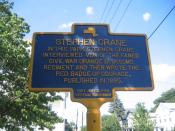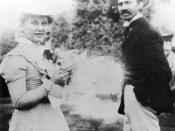Do you think you have an interesting life? You may think so, but by some others standards, yours is relatively boring and uneventful. Although you've probably heard of him, or at least read his book, you probably do not have any idea of who Steven crane really was. He is the author one, if not the most extraordinary, novel of the nineteenth century. Crane might just be one of the most interesting people you will ever gain knowledge of.
Crane has done just about everything possible by a human that dies at the extremely young age of twenty-eight years. He lived penniless and malnourished on the streets of New York City. He also became world renown virtually overnight during his years in Europe he mingled with the most prestigious of writers including Joseph Conrad, Henry James, H. G. Wells, and Ford Maddox Ford. During his years of writing he piled up enough to fill twelve volumes of work.
One of the most interesting things that separated Crane from the rest was that he preformed the writing process in reverse. He wrote, then went and experienced the events, instead of experiencing then recounting the events as normal writers do. This war novel was written before he had been even remotely close to a battle field he also wrote about a prostitute, later, he experienced a love affair with a madam of real life. He wrote about shipwrecks. Then found him self in one.
Born in Newark, New Jersey in 1871. He was the fourteenth child of a forty-five year old mother. His mother, a tireless spokes woman for the womens Christian Temperance Union, had lost her four previous children within the first year of birth. His father was a Methodist minister who published tracts attacking items such as tobacco, alcohol, dancing, theatre, novels, and surprisingly, baseball. Crane lost some of his family on his way to adulthood. His father at age 7, his sister at age 12, his brother at age 14.
His early ages were plagues with rebellious outbursts. One, as recalled by a friend, was that he bought alcohol and then proceeded to go into public and drink it at the innocent age of ten. In hope of developing his character, his mother sent him away, to military school. Later along in his life he was best known for his profuse gambling, drinking, and smoking. He tried two different colleges, including Lafayette, and Syracuse University. He lasted one semester at each before he was dismissed because of conduct violations. He then began a book entitled "Maggie"ÃÂ about his life in the slums of New York. In December of 1891 his mother died. By early 1892 "Maggie"ÃÂ was completed and he tried to publish it, he failed, no publisher would accept if with its gruesome index of words.
Cranes life in New York was terrible compared to today's standards, no home, no food, and no family. He began reading accounts of veteran soldiers from the Civil War. He started writing "The Red Badge of Courage"ÃÂ at the age of twenty-one by writing on anything, even the paper the meat came in. The war is seen through the eyes of a young union private in the first two days of his first battle. "The Red Badge if Courage"ÃÂ is written with a powerful economy and intensity that has been called symbolistic and realistic. This book was the zenith of Crane's career. It was first published in series form by hundreds of newspapers. The book version came along later. The novel was a best seller in America and England.
Crane went to Nebraska to "do a little writing and cure his cough"ÃÂ says on of his friends. Next he went south to New Orleans. While in the south he testified with Dora Clark, who was accused of prostitution. This was risking his reputation greatly, yet his testimony got Clark discharged. Crane later began his unyielding pursuit to fight in a battle. Crane traveled to Florida where he would take a boat to Cuba where he believed a war would break loose soon. His boat capsized and he was afloat in the sea for over thirty hours in a life raft. Crane was still in pursuit of battle when he heard Greece and Turkey would soon start to fight. Once to Europe, he was sidetracked while buying a home in England and furnishing it with an unofficial wife named Cora Taylor. When America declared war upon Spain in the spring of 1898 he immediately joined the effort and was accepted as a correspondent. A real war experience was within grasp for Crane. He was soon under enemy fire in San Juan Hill. He once told a friend that his fondest desire was to die during combat. It was very relevant in his frequent acts of reckless bravery.
He returned to England in 1899 to Cora. He now has the lung disease of tuberculosis. He died on the fifth of June in 1900. He once said " one makes room in Heaven for all sorts of soul"æ who are not confidently expected to be there by many excellent people."ÃÂ





